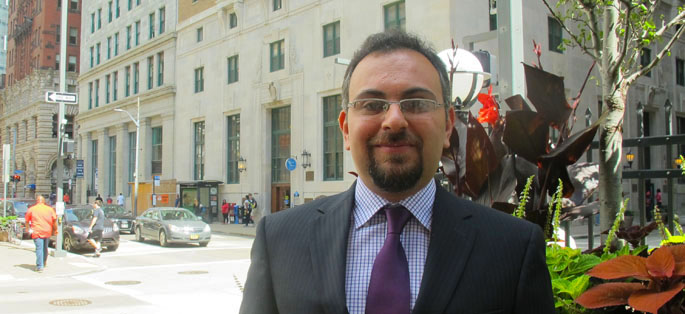Engineering Professor Brings Work Experience From Iran and Canada to the Classroom Wednesday, October 12, 2016

Yaser Roshan, Ph.D., was recently hired by Point Park University as an assistant professor of electrical engineering. Prior to joining Point Park, Roshan was a post-doctoral fellow at Simon Fraser University in Vancouver, British Columbia, Canada, in which he worked with BigMotion Technologies, Inc., on energy harvesting and power management techniques for hybrid-powered wearable health-tracking devices. Before moving to Canada, he was a project manager and chief research engineer for East Electrical Economics Research Group and a research and design development engineer for Moham Shargh Co. and Niroo Research Institute in Iran.
What inspired you to pursue a career in the electrical engineering field?
My main expertise is in control engineering, which is a subspecialty of electrical engineering. The top reason I chose this field was that although it is categorized under electrical engineering, its applications expand to not only engineering fields, but also a variety of other sciences. I tell my students all the time that the tools the subfield of control engineering provides will be useful in having a better understanding of the world around us and how we interact.
What drew you to Point Park University?
My ideal career was always to work in an academic environment, specifically for the goal of transferring knowledge to others. After I earned a Ph.D., I began pursuing this goal.
The reason I was interested in joining Point Park University, specifically, was for its new electrical engineering program being offered. The opportunity to help build a new engineering program and its curriculum, laboratories, etc. seemed challenging, motivating and interesting.
So far, what do you enjoy most about Pittsburgh and Point Park?
Pittsburgh has a lot to offer and is a really great city for a newcomer. I joined the University this past summer and enjoyed the green, beautiful environment of the city. The people here are very warm and welcoming. This of course includes Point Park's staff and faculty members. During my first days here, I was able to transition automatically, thanks to the professional and friendly help of my colleagues.
Another enjoyable fact about Point Park University is having students who come to class from their full-time jobs in the engineering industry. The strong enthusiasm and motivation of the students to learn new knowledge is a fascinating aspect of Point Park, which I have not yet seen in other universities.
How do you bring your professional experiences as an engineer in Iran and Canada into the classroom?
I have worked in both countries as an instructor and an engineer, and I saw lots of differences in the methods of teaching. Based on these experiences, I believe that an engineer should be able to have a practical understanding of the concepts, as well as a theoretical background, to be able to analyze and design. Therefore, in my classroom I try to engage students in the theoretical backgrounds, while at the same time demonstrating the practical examples of the theories in various applications.
Also, in many instances, just knowing the material is not enough to work in a professional environment. Being able to collaborate with one another, to write technical and comprehensive reports and to communicate with colleagues are also important skills I emphasize to my students.
What career advice do you have for our electrical engineering students?
My main advice to students is to know that all of the courses in the curriculum are there for a reason. For many of the courses, the practical reason may not be clear during the semester or even until the end of the program, but these courses will definitely come in use for you in your professional lives as engineers.
Also, in many engineering careers, there is lots of overlap between various engineering fields. Therefore, it's really useful for electrical engineers to be introduced to the basics of other fields and have an understanding of the main concepts. This knowledge will become very handy in the future.
More About: faculty, electrical engineering, School of Arts and Sciences, international

